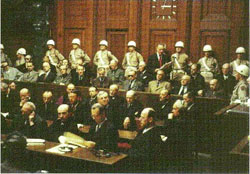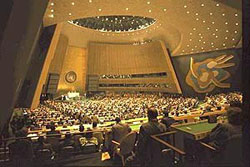Bush's War Plan Intends 'Crimes against Humanity,' by Bob Fitrakis and Harvey Wasserman
What Can the World Do if the US Attacks Iraq? by Jeremy Brecher
March 14, 2003

Bush's War Plan Intends 'Crimes against Humanity'
by Bob Fitrakis and Harvey Wasserman
 |
| Captured German politicians and military personnel stand trial for war crimes in Nuremberg in 1946. "Once a government resorts to terror against its own population to get what it wants, it must keep using terror against its own population to get what it wants. A government that terrorizes its own people can never stop. If such a government ever lets the fear subside and rational thought return to the populace, that government is finished." - Michael Rivero |
(March 2, 2003) - If he launches an attack on Iraq without the approval of the United Nations Security Council, George W. Bush will be guilty of crimes on par with those committed by the infamous Nazi leaders who were tried at Nuremberg in 1948, after World War II.
The law is clear. At Nuremberg, American, British, French and Soviet jurists used international conventions, legal precedent and a global moral consensus to establish a code of conduct deemed the standard for all nations.
Key was the "crimes against humanity" prohibition stemming from the conscious slaughter of six million Jews, leftists, gypsies and others by the Nazi fanatics.
But also crucial was the ban on unprovoked attack by one nation against another. The explosive fuse that set off World War II was the September 1,1939 Nazi attack on Poland, which was unprovoked by any stretch of the military imagination. By all accounts it was an act of aggression and conquest, which led ultimately to as many as 50 million deaths over the next six years.
Article VI of the Nuremberg Charter defines "Crimes Against Peace" as "planning, preparation, initiation or waging of war of aggression, or a war in violation of international treaties ... or participation in a common plan or conspiracy ... to wage an aggressive war.
Following in the Footsteps of Hitler
A week before the unprovoked Nazi assault on Poland, Hitler promised his generals he would provide "a propagandistic reason for starting the war." [See "How to Fake a Wargasm," The-Edge] He then justified a "preemptive" strike based on lies about a non-existent Polish Army attack against Germany.
The Nazi attack date had been set for more than a year. "The victor will not be asked afterwards whether he told the truth or not," Hitler told his generals. "In starting and waging a war it is not right that matters, but victory."
After Hitler's deceptions were revealed at Nuremberg, the surviving Nazis based their defense on the claim of "preventative war," claiming a need to protect Germany from a pending Polish attack. They were the last, until Bush, to use that rationale.
It didn't work. For this attack, ranking Nazi commandants, starting with Hermann Goering, Hitler's Number Two, were convicted and sentenced to death. That charge and that alone was deemed sufficient to warrant hanging.
Unless Saddam Hussein launches an attack on the United States very soon, any American attack on Iraq without UN approval would be on a legal par with the Nazi attack on Poland.
A key US argument, that Iraq was somehow linked to the September 11 terror attacks, has been definitively dismissed. In the eighteen months since, all credible evidence points to intense hostility rather than cooperation between Al Qaida and Saddam Hussein. Colin Powell, arguing in front of the UN, failed to prove any cooperative connection.
Iraq has been ordered to disarm by the United Nations, whose legal legitimacy was essential to the 1991 campaign that drove Saddam Hussein out of Kuwait.
Thus far, there is no United Nations consensus that the Iraqis have definitively failed to comply with the terms of that defeat to an extent that would justify a renewed military attack, one that would inevitably involve civilian casualties.
Preemptive Attacks on Democracy in the US
With no claim to having been attacked, George W. Bush has instead argued that his war on Iraq would be "preemptive," meant to prevent Saddam from launching a future war. But Iraq has not attacked anyone in more than 12 years and two-thirds of the country is under a no-fly zone. Thus Bush is merely resurrecting the preventative war doctrine invoked by the Nazis before their Nuremberg hanging.
In 1953 President Dwight Eisenhower, the former Supreme Allied Commander, dismissed the idea of a preventative war against the Soviet Union. "All of us have heard this term 'preventive war' since the earliest days of Hitler," he said. "I don't believe there is such a thing; and, frankly, I wouldn't even listen to anyone seriously that came in and talked about such a thing."
George W. Bush has now added to the list of pre-war demands a "regime change" by which Saddam Hussein would give up power. Bush then proposes rebuilding Iraq along democratic lines.
But Nazi functionaries at Nuremberg also received stiff sentences for approving essentially the same totalitarian statutes that now appear in the Homeland Security, Patriot I and Patriot II Acts authorizing secret arrest, detention and "disappearances" of American citizens without legal recourse or public notification. At Nuremberg, such laws were recognized as a form of state terror.
The embrace of such laws in America casts serious doubt on the Bush Administration's real willingness to install democracy anywhere else.
When the Nazis attacked Poland in 1939, no one envisioned that just eight years later Germany would be leveled and its all-powerful reichmarshalls would be tried and sentenced under international law.
Such a vision seems less far-fetched today. America's current military might has prompted the Bush Administration to frame its proposed war in terms of a "crusade" against "evil." But military action against Iraq is guaranteed to inflame the passions of 1.2 billion Muslims. The proposed war is explicitly opposed by the Pope. International support is extremely limited. The US itself is deeply divided, with its economy in serious trouble.
The diplomatic campaign for this attack has been handled with all the wisdom and foresight of madmen lighting matches in a room full of gasoline. There is no reason to expect a military campaign would be handled any better.
Bush and his Advisors Could Face a 'Judgement at Nuremberg'
It is clear from the precedents at Nuremberg that any American attack on Iraq without United Nations approval would be illegal under international law. It is also clear that the inevitable civilian casualties resulting from such an attack would qualify as crimes against humanity.
And sooner or later, the American perpetrators of such an attack and related crimes might well find themselves standing trial before some sort of Nuremberg-style international tribunal.
Given such circumstances, the guilt of George W. Bush will not be in doubt. But the guilt of subordinates giving supporting orders, and of soldiers and functionaries carrying them out, will also be a given.
The Nuremberg court, including its American judges, repeatedly ruled that those who "only followed orders" in committing atrocities were guilty of crimes against humanity.
Those willing Americans executioners who "only follow orders" in perpetrating this illegal attack on Iraq should understand that they stand to be found just as guilty as the ones giving those orders.
And that one way or another, sooner or later, that guilt will demand payment.
Harvey Wasserman is senior editor of http://www.freepress.org and author of The Last Energy War (Seven Stories Press). Bob Fitrakis is publisher of http://www.freepress.org and author of The Firtakis Files: Spooks, Nukes & Nazis.
What Can the World Do if the US Attacks Iraq?
by Jeremy Brecher
 |
| "Our government has kept us in a perpetual state of fear - kept us in a continuous stampede of patriotic fervor - with the cry of grave national emergency. Always there has been some terrible evil at home or some monstrous foreign power that was going to gobble us up if we did not blindly rally behind it." - General Douglas MacArthur, 1957 |
If the US attacks Iraq without support of the UN Security Council, will the world be powerless to stop it? The answer is no. Under a procedure called "Uniting for Peace," the UN General Assembly can demand an immediate cease-fire and withdrawal. The global peace movement should consider demanding such an action.
When Egypt nationalized the Suez Canal in 1956, Britain, France, and Israel invaded Egypt and began advancing on the Suez Canal. US President Dwight D. Eisenhower demanded that the invasion stop. Resolutions in the UN Security Council called for a cease-fire - but Britain and France vetoed them. Then the United States appealed to the General Assembly and proposed a resolution calling for a cease-fire and a withdrawal of forces. The General Assembly held an emergency session and passed the resolution. Britain and France withdrew from Egypt within a week.
The appeal to the General Assembly was made under a procedure called "Uniting for Peace."
This procedure was adopted by the Security Council so that the UN can act even if the Security Council is stalemated by vetoes. Resolution 377 provides that, if there is a "threat to peace, breach of the peace, or act of aggression" and the permanent members of the Security Council do not agree on action, the General Assembly can meet immediately and recommend collective measures to UN members to "maintain or restore international peace and security."
The "Uniting for Peace" mechanism has been used ten times, most frequently on the initiative of the United States.
The Bush Administration is currently promoting a Security Council resolution that it claims will authorize it to attack Iraq. However, huge opposition from global public opinion and most of the world's governments make such a resolution's passage unlikely.
What will happen if the US withdraws its resolution or the resolution is defeated? The US is currently indicating that it will attack Iraq even without Security Council approval. The US would undoubtedly use its veto should the Security Council attempt to condemn and halt its aggression. But the US has no veto in the General Assembly.
Lawyers at the Center for Constitutional Rights [www.ccr-ny.org] have drafted a proposed "Uniting for Peace" resolution that governments can submit to the General Assembly. It declares that military action without a Security Council resolution authorizing such action is contrary to the UN Charter and international law.
The global peace movement can begin right now to discuss the value of such a resolution. If we conclude it is worthwhile, we can make it a central demand, for example in the next round of global anti-war demonstrations. Then we can mobilize pressure on governments that claim to oppose the war - the great majority of UN members - to demand that they initiate and support such a resolution.
Countries opposed to such a war can be asked to state now that, if there is a Security Council deadlock and a US attack on Iraq is imminent or under way, they will convene the General Assembly on an emergency basis to condemn the attack and order the US to cease fire and withdraw.
The sooner global public discussion begins laying the groundwork for such action the better. Wide public advocacy will help governments overcome their probable reluctance to take such a step. Further, the threat of such global condemnation may help deter the Bush administration - and to a much greater extent deter its wobbling allies - from launching such an attack in the first place.
Information on Uniting for Peace based on "A UN Alternative to War: 'Uniting for Peace'" by Michael Ratner, Center for Constitutional Rights and Jules Lobel, University of Pittsburgh Law School [www.ccr-ny.org. http://www.commondreams.org/views03/0305-01.htm]
For more information contact:







